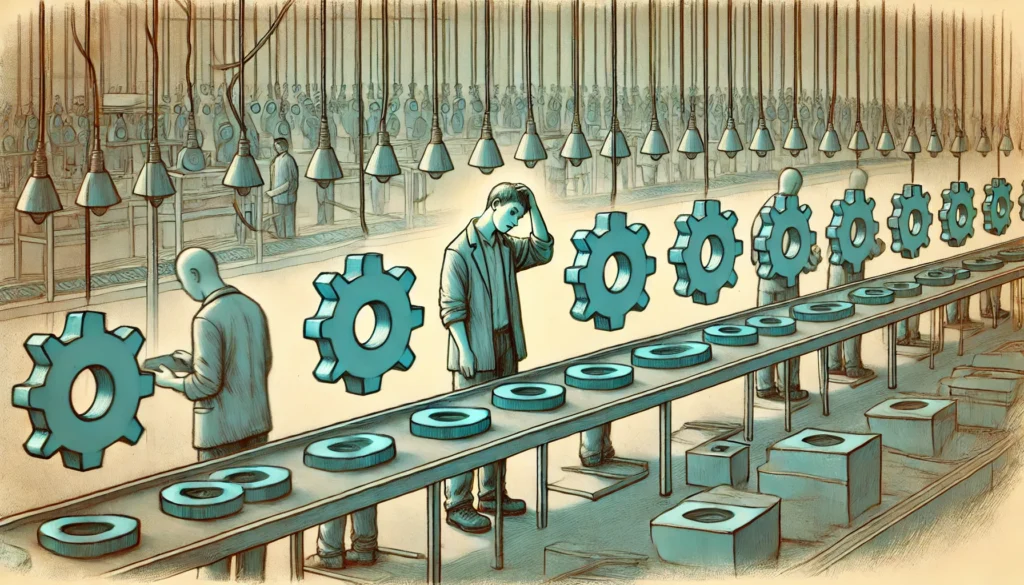In this article, we delve into the top careers not suited for ADHD, examining the challenges they pose and offering insights on why these roles might be best avoided. Our aim is to provide comprehensive, nuanced guidance that balances scientific facts with practical advice, empowering individuals with ADHD to make career choices that align with their strengths and preferences.
You may also like: Enhancing Concentration: Strategies for ADHD
Understanding ADHD: A Brief Overview
ADHD is a neurodevelopmental disorder characterized by symptoms such as inattention, hyperactivity, and impulsivity. These symptoms can vary significantly in severity and manifest differently in each individual. Understanding ADHD’s impact on daily functioning is crucial when considering career choices.
The Nature of ADHD
ADHD is not just about being inattentive or hyperactive; it involves a complex interplay of cognitive and behavioral symptoms. These symptoms can include difficulty focusing on tasks, an inability to sit still, and a tendency to act on impulse without considering consequences. Recognizing these patterns can aid in understanding how ADHD impacts work performance and the types of environments that may be more challenging.
Variability Among Individuals
Each person with ADHD experiences symptoms uniquely. Some may struggle more with inattention, while others find hyperactivity and impulsivity more challenging. This variability means that career advice should be personalized, taking into account the individual’s specific strengths and weaknesses. Tailoring career paths to fit personal needs can lead to more fulfilling professional experiences.
The Impact on Daily Functioning
ADHD can affect various aspects of daily life, including time management, organization, and emotional regulation. These challenges can be particularly pronounced in work environments that demand prolonged focus, meticulous attention to detail, and rigid adherence to routine. Understanding these impacts can guide individuals in choosing careers that accommodate or leverage their natural tendencies.
The Worst Jobs for ADHD: Key Characteristics
Certain job characteristics can be particularly challenging for individuals with ADHD. Recognizing these can help steer career choices away from roles that might exacerbate ADHD symptoms.
High-Stakes, High-Pressure Environments
Jobs that involve high-stakes decision-making and time-sensitive tasks can be particularly challenging for individuals with ADHD. The constant pressure to perform and meet tight deadlines can exacerbate symptoms of inattention and impulsivity, leading to increased stress and burnout.
Example Professions
Professions in finance, emergency medicine, or air traffic control often require sustained concentration and split-second decision-making, which may be overwhelming for someone with ADHD. These roles demand an ability to manage stress effectively and maintain a high level of alertness over prolonged periods, conditions that can be particularly challenging for those with ADHD.
Psychological Impacts
The psychological strain of constantly being on high alert can lead to chronic stress, anxiety, and burnout. Individuals with ADHD might find it difficult to manage these demands without adequate support and coping strategies, making it crucial to assess one’s resilience and ability to handle high-pressure environments.
Coping Strategies
For those in or considering such roles, developing robust coping mechanisms is essential. Techniques such as mindfulness, regular breaks, and structured routines can help manage stress levels. Additionally, seeking supportive colleagues or mentors can provide an essential buffer against the pressures of these environments.
Routine and Repetition
Careers that involve monotonous tasks and a lack of variety may not align well with the ADHD brain’s need for stimulation. Repetitive jobs, such as data entry or assembly line work, can quickly become tedious, leading to decreased motivation and productivity.
The Need for Stimulation
The ADHD brain often craves novelty and stimulation, making repetitive tasks particularly challenging. Without engagement or variety, individuals with ADHD might struggle to maintain focus and interest, leading to decreased job satisfaction and performance.
Risk of Burnout
Monotonous roles can lead to a sense of burnout and dissatisfaction much faster in individuals with ADHD. The lack of mental stimulation can feel draining, exacerbating symptoms and leading to a decline in overall well-being.
Strategies for Success
For those who find themselves in repetitive roles, seeking opportunities to introduce variety, such as taking on different projects or responsibilities, can be beneficial. Employers who recognize this need can help create more dynamic work environments that cater to diverse working styles.
Strictly Structured Work Environments
Rigid corporate structures with stringent rules and a lack of flexibility can pose significant challenges for those with ADHD. Such environments may not accommodate the need for breaks, flexible working hours, or personalized approaches to task management.
Importance of Flexibility
Flexibility in work environments can significantly impact the performance and well-being of individuals with ADHD. Jobs that allow for flexible schedules, remote work, or customized workflows can enable individuals to manage their symptoms more effectively.
The Downside of Rigidity
In contrast, environments that prioritize conformity over creativity, like certain roles in the military or large bureaucracies, may stifle the natural strengths of individuals with ADHD. These settings often offer little room for adapting one’s work style, making it difficult to thrive.
Finding the Right Fit
For individuals with ADHD, finding an employer willing to accommodate different working styles is crucial. This might involve seeking roles in more progressive companies or industries known for their flexible work policies and supportive cultures.
Detail-Oriented Roles Requiring Precision
Jobs that demand meticulous attention to detail and precision, such as accounting or laboratory research, can be difficult for individuals with ADHD. The need for sustained focus on minute details may clash with the ADHD brain’s tendency to become easily distracted.
Examples of Challenging Roles
Careers in fields like accounting, auditing, or data analysis require a precision that can be challenging for individuals with ADHD. These roles often involve prolonged periods of focus on intricate details, increasing the likelihood of errors.
Consequences of Errors
In these roles, small mistakes can have significant consequences, adding pressure and stress. This high-stakes environment can exacerbate symptoms, leading to increased anxiety and decreased job performance.
Adaptive Techniques
Individuals in these fields might benefit from using organizational tools and techniques to manage their work. Implementing systems for double-checking work, using technology aids, and breaking tasks into smaller, manageable parts can help mitigate the challenges of these roles.

ADHD Jobs to Avoid: Specific Professions
Identifying specific professions that might be less suitable for individuals with ADHD can help guide career exploration towards more compatible paths.
Accountancy and Financial Analysis
Accountancy requires a high degree of accuracy and attention to detail. The repetitive nature of tasks, such as balancing books and preparing financial reports, can be particularly challenging for those with ADHD.
Nature of Tasks
The work often involves routine, meticulous tasks that require sustained attention and precision. This can be particularly challenging for individuals who struggle with inattention and impulsivity, common symptoms of ADHD.
Stressors in the Profession
The pressure to avoid errors in financial analysis can exacerbate symptoms of inattention and impulsivity, making this profession less suitable for individuals with ADHD. The constant demand for accuracy can add to stress levels, impacting overall job satisfaction and performance.
Alternatives to Consider
For those interested in finance, roles that involve more dynamic and strategic thinking, such as financial consulting or investment advising, might provide a better fit. These positions often allow for more creativity and interaction, catering to the strengths of individuals with ADHD.
Air Traffic Control
Air traffic control is one of the most high-pressure jobs, requiring constant vigilance and the ability to make rapid decisions. The stakes are incredibly high, and the need for sustained concentration can be overwhelming for someone with ADHD.
Demands of the Role
The demanding nature of the job, combined with irregular hours, can exacerbate ADHD symptoms and lead to significant stress. The role requires a level of multitasking and precision that can be particularly challenging for individuals with ADHD.
Impact on Well-being
The high-stakes environment can lead to increased anxiety and burnout, making it a less suitable profession for those who struggle with attention and impulse control. The irregular hours can also disrupt sleep patterns, further impacting health and well-being.
Exploring Alternatives
For those interested in aviation, roles such as aviation management or flight operations might provide a better balance. These positions often involve a mix of strategic planning and problem-solving, allowing for more flexibility and creativity.
Assembly Line Work
Assembly line work involves repetitive tasks and a lack of variety, which can quickly become monotonous for individuals with ADHD. The structured nature of the work, with little room for creativity or variation, may not align with the need for stimulation and change.
Nature of the Work
The work is often repetitive and structured, with little opportunity for deviation or creativity. This can lead to decreased motivation and productivity for individuals who thrive on variety and novelty.
Psychological Effects
The monotony of assembly line work can lead to feelings of frustration and dissatisfaction, exacerbating ADHD symptoms. Without adequate stimulation, individuals may struggle to maintain focus and engagement in their tasks.
Finding a Better Fit
Exploring roles in manufacturing that offer more variety and problem-solving opportunities might be more suitable. Positions in product development or quality assurance can provide a more stimulating environment, aligning better with ADHD strengths.
Legal Professions
The legal field often requires extensive reading, detailed analysis, and meticulous documentation. The need for sustained focus and precision, combined with high-pressure deadlines, can be challenging for those with ADHD.
Demands of Legal Work
Legal professions often involve a significant amount of paperwork, research, and attention to detail. This can be particularly challenging for individuals with ADHD, who may struggle to maintain focus over long periods.
Stress and Pressure
The high-pressure nature of legal work, with constant deadlines and the need for precision, can exacerbate ADHD symptoms, leading to stress and burnout. The demand for perfection can be overwhelming without adequate support and coping strategies.
Exploring Suitable Roles
Within the legal field, roles that involve more dynamic and interactive work, such as litigation or mediation, might better suit individuals with ADHD. These positions often require quick thinking and adaptability, leveraging the strengths of ADHD traits.

Considerations for Career Choices
While it’s important to be aware of potential challenges, it’s equally crucial to recognize that individuals with ADHD can thrive in many professions with the right support and accommodations. Here are some considerations when exploring career options:
Leverage Strengths
Identify and leverage strengths such as creativity, enthusiasm, and the ability to think outside the box. Careers that offer opportunities for innovation and problem-solving, such as entrepreneurship, the arts, or technology, may be well-suited for individuals with ADHD.
Recognizing Unique Skills
Individuals with ADHD often excel in environments that value creativity and innovation. Recognizing these skills can help guide career choices towards roles that make the most of these strengths.
Career Paths to Consider
Fields like technology, arts, and entrepreneurship offer dynamic and stimulating environments that can be particularly rewarding for individuals with ADHD. These roles often involve problem-solving, creativity, and adaptability, aligning well with ADHD strengths.
Building on Strengths
Building a career around one’s strengths can lead to greater job satisfaction and success. By focusing on roles that leverage creativity and enthusiasm, individuals can find fulfilling and rewarding career paths.
Seek Accommodations
Explore workplaces that offer flexibility, such as remote work options, flexible hours, or customizable work environments. Discuss potential accommodations with employers, such as noise-canceling headphones, additional breaks, or task management tools, to enhance productivity and well-being.
Importance of Workplace Flexibility
Flexible work environments can significantly enhance productivity and well-being for individuals with ADHD. Employers who offer accommodations can create more inclusive and supportive workplaces.
Potential Accommodations
Discussing potential accommodations with employers, such as task management tools, noise-canceling headphones, or flexible hours, can help create a more supportive work environment. These adjustments can enhance productivity and overall job satisfaction.
Advocacy and Communication
Effective communication with employers about individual needs is crucial. By advocating for necessary accommodations, individuals with ADHD can create a work environment that supports their success and well-being.
Pursue Passion
Prioritize careers that align with personal interests and passions, as intrinsic motivation can significantly enhance focus and engagement. When individuals are passionate about their work, they are more likely to overcome challenges and excel in their roles.
Identifying Interests
Identifying personal interests and passions can guide career choices towards roles that offer intrinsic motivation. This can lead to greater job satisfaction and performance.
Benefits of Passion-Driven Work
Pursuing a career that aligns with personal passions can significantly enhance focus and engagement. When individuals are passionate about their work, they are more likely to overcome challenges and excel in their roles.
Exploring Passionate Paths
Exploring career paths that align with personal interests can lead to fulfilling and rewarding work experiences. By prioritizing passion-driven work, individuals with ADHD can find greater satisfaction and success in their careers.

Conclusion
Choosing the right career path is a deeply personal decision, and understanding the unique strengths and challenges associated with ADHD is essential. While certain professions may pose difficulties, individuals with ADHD can thrive in many roles that align with their strengths and interests.
By recognizing potential challenges and seeking supportive environments, individuals with ADHD can navigate their career paths with confidence and success. With the right support and accommodations, individuals with ADHD can build fulfilling and rewarding careers that leverage their unique strengths and talents.
Further Reading:
The 16 Best Jobs for Creative & Restless ADHD Brains
7 Jobs That Are Not So ADHD Friendly
Important Note: The information contained in this article is for general informational purposes only, and should not be construed as health or medical advice, nor is it intended to diagnose, prevent, treat, or cure any disease or health condition. Before embarking on any diet, fitness regimen, or program of nutritional supplementation, it is advisable to consult your healthcare professional in order to determine its safety and probable efficacy in terms of your individual state of health.
Regarding Nutritional Supplements Or Other Non-Prescription Health Products: If any nutritional supplements or other non-prescription health products are mentioned in the foregoing article, any claims or statements made about them have not been evaluated by the U.S. Food and Drug Administration, and such nutritional supplements or other health products are not intended to diagnose, treat, cure, or prevent any disease.


